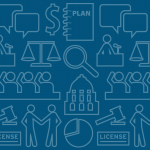For this month’s legislative update, we highlight bills seeking to strengthen emergency preparedness and other essential public health services by improving public health data collection and sharing.
Data are central to public health; it is how we tap into the scale and variety of lived experiences and local conditions in our communities and tailor responses to complex or evolving public health risks. This is especially important as we implement lessons learned during COVID-19. We’ve seen promising efforts to modernize public health data infrastructure, embed equity in data practices, facilitate data sharing, and ensure public access to data while also protecting individual privacy interests. Here are some highlights from the past three state legislative sessions:
- Colorado enacted a law requiring the state to collect data on race, ethnicity, disability, sexual orientation, and gender identity and to issue health equity reports that address social determinants of health and strategies to address health disparities.
- Maryland enacted a law requiring the state-designated health information exchange, CRISP, to operate as a “health data utility” and provide data in real-time to public health officials and other individuals and organizations in support of public health purposes.
- Illinois enacted a law requiring the state to make all public health data related to a locality available upon request of the local health department for purposes of preventing or controlling disease, injury, or disability.
- Four states – Illinois, Nevada, Hawaii, and Massachusetts – enacted laws in 2023 requiring collection of data on race and ethnicity subgroups that are more specific than the categories required by the federal Office of Management and Budget. More information on state data disaggregation laws is available from the Leadership Conference Education Fund.
- New Jersey enacted a law creating a pandemic task force on racial equity whose goals include proposing improvements to existing data systems so that the state’s communities of color and communities at higher risk of experiencing health inequities are better heard and connected to needed resources.
However, backlash to COVID-19 responses in some places has threatened the ability of public health staff and officials to effectively harness data to better serve their communities while responding to pandemics and other public health hazards. For example, the Trump administration diverted COVID-19 data collection from the Centers for Disease Control and Prevention to its parent agency, the Department of Health and Human Services, in line with a trend of shifting public health powers away from public health experts who are more likely to be insulated from inappropriate political influences. Data also became embroiled in broader fights over the scope of local authority to enact public health measures; for example, more than half a dozen local health departments in Missouri halted essential COVID-19 services — including contact tracing, case tracking, and release of data to the public — in response to threats of legal action from Missouri's attorney general, Eric Schmitt. Here are some examples of recent state legislative activity on this front:
- Minnesota introduced a bill in its current 2023-2024 legislative session that would prohibit mandatory contact tracing by employers; impose other limits on contact tracing, immunizations, and communicable disease testing; and prohibit requiring any person to disclose their communicable disease status.
- Indiana introduced but failed to enact a bill in its 2023 legislative session that would have removed a requirement that schools record or include certain immunization information in the official high school transcript for a high school student. The bill also would have stripped the state health department’s authority to expand or modify the list of communicable diseases that require documentation of immunization for a student.
COVID-19 also raised collective awareness of long-standing data justice issues experienced by BIPOC communities and tribal nations. For tribal nations in particular, these issues deeply implicate tribal sovereignty, which encompasses inherent authority to govern the collection, ownership, and application of their own data. For readers seeking tools and partnerships that address tribal data justice issues head-on, please explore related resources from NativeDATA and our partners at the Network for Public Health Law.
As these highlights show, important work is already underway to preserve and strengthen the use of public health data to protect our communities and advance health equity. Looking ahead, we expect to see more of these efforts and will continue to track related developments addressing these issues. For additional information on these timely public health data-related topics, see the Network for Public Health Law’s resources on disaggregation of public health data by race and ethnicity, a tool to facilitate public health data collection, HIPAA and privacy of reproductive health records, post-COVID CDC data collection and surveillance, and health equity and race/ethnicity data collection barriers.
Be sure to check out Act for Public Health to subscribe to legislative updates or to find additional resources, trainings, and a network of law and policy peers available to help you explore re-centering public health and health equity.
9/28/2023
